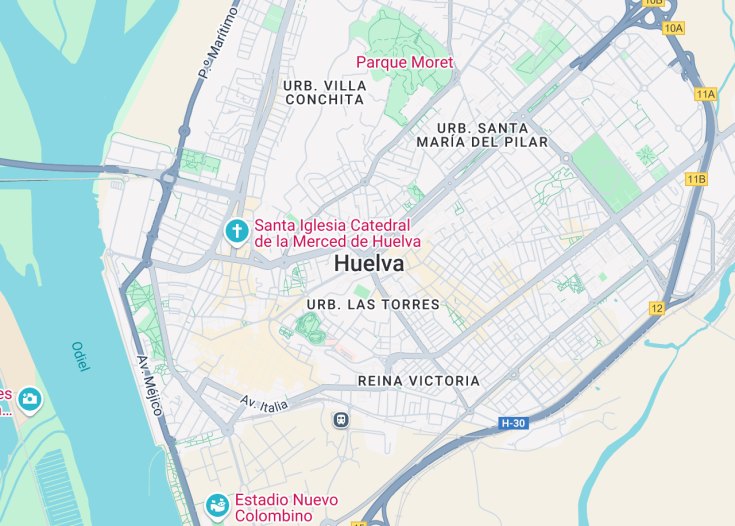Huelva, a captivating city located in southwestern Spain, offers a unique blend of natural beauty and historical significance. Renowned for its pristine beaches and lush natural reserves, Huelva also holds a rich maritime heritage linked to the Age of Discovery.
Visitors can explore ancient sites, indulge in succulent seafood, and immerse themselves in vibrant local traditions and festivals. This destination promises an enriching experience that beautifully balances historical exploration with the joys of coastal leisure.
Make sure to visit the Doñana National Park, a UNESCO World Heritage site, to witness a diverse range of flora and fauna in one of Europe’s most important wetlands.
Consider timing your visit during the Festival of Colombinas, which celebrates Huelva’s connection to Christopher Columbus, for a culturally rich experience.
Top things to do & see in Huelva
Select the following sights and activities to discover best tickets and tours available in Huelva.
Huelva: A Gateway to the Past and Present
| Country | Spain |
| Time in Huelva | GMT+2 |
| Language spoken | Spanish |
| Population | 148,107 (Source: Instituto Nacional de Estadística, 2023) |
| Currency | Euro (€, EUR) |
| Airports |
|
Huelva, a captivating city located in southwestern Spain, has a profound historical lineage intertwined with the discoveries of the New World. Nestled at the confluence of the Odiel and Tinto rivers, this port city was the launch point for Christopher Columbus’s 1492 voyage, etching its name in the annals of history. Modern-day Huelva blends its rich heritage with vibrant city life, offering a mix of scenic landscapes, cultural sites, and flavorful gastronomy rooted in Andalusian tradition.
Where is Huelva?
Huelva is situated in the autonomous community of Andalusia, positioned strategically near the Atlantic coast of southern Spain.
Distances:
| Route | Distance by car | Time by car |
|---|---|---|
| Madrid to Huelva | 340 miles | 5 hours 30 minutes |
| Seville to Huelva | 70 miles | 1 hour 10 minutes |
| Lisbon to Huelva | 200 miles | 3 hours 15 minutes |
What is Huelva famous for?
Huelva is renowned for its historical significance as the launching point for Christopher Columbus’s expeditions to the Americas. It is also famous for its local cuisine, especially its seafood and jamón ibérico (Iberian ham).
History
Prehistoric to Roman Era (Before 1000 B.C. – 5th century)
The region of Huelva in Spain boasts a rich tapestry of history, marked by ancient civilizations and significant archaeological discoveries. Originally inhabited by Tartessian tribes around 3000 B.C., the area was known for its strategic importance due to its mineral wealth. The discovery of the Riotinto mines drew not only local but also distant interests, including those from Phoenicians and later the Romans, who established Onuba (modern-day Huelva) in the first millennium B.C. During Roman rule, it flourished as a commercial and administrative center, pivotal in the mining and export of precious metals.
Medieval Period (5th century – 15th century)
After the fall of the Roman Empire, Huelva experienced periods of Visigothic rule followed by Islamic dominance when it was part of Al-Andalus. The town saw several changes in governance, influenced significantly by the proximity to the Portuguese border and the ongoing Reconquista movement. It was during the late 15th century that Huelva gained prominence with the preparation of Christopher Columbus’ first voyage to the Americas, launching directly from the nearby Palos de la Frontera.
Modern Era (16th century – present)
With the discovery of the New World, Huelva entered a golden age due to its active involvement in transatlantic trade. The 19th and 20th centuries marked a new era of industrialization, particularly with the British development of the mining sector. The landscape of Huelva was dramatically transformed during this period, which also saw the construction of the Río Tinto Company Railway. In contemporary times, Huelva has embraced its historical and natural heritage, promoting tourism alongside sustainable development, continually shaping its identity into the vibrant city it is today.
Visit Huelva
What to see and do in Huelva
Exploring Huelva offers a blend of cultural, historical, and natural attractions. Key sites include the Wharf of the Caravels, a fascinating museum with replicas of Columbus’ ships, the Niña, the Pinta, and the Santa María. Nature enthusiasts will appreciate the stunning landscapes of Doñana National Park, one of Europe’s most important wetland reserves.
The city’s center is home to the Cathedral of La Merced and the Casa Colón, both significant in their historical and architectural merit. Additionally, visitors can stroll along the Odiel Marshes or explore the mining history through the Riotinto Mining Museum.
- Wharf of the Caravels
- Doñana National Park
- Cathedral of La Merced
- Casa Colón
- Odiel Marshes
- Riotinto Mining Museum
Celebrations and Festivals in Huelva
Huelva is host to an array of vibrant festivals, notably the Festival of Las Colombinas, commemorating Columbus’ departure, held in the first week of August. The city also celebrates its patron saint, La Virgen de la Cinta, each September with religious and cultural events, drawing many visitors and locals alike.
Best time to visit Huelva
The ideal times to visit Huelva are during spring and autumn. These seasons offer mild weather, perfect for enjoying both the cultural landmarks and the beautiful natural scenery, making it pleasant to explore the wide array of attractions without the extreme heat of the Andalusian summer.
is Huelva worth visiting?
Huelva is emphatically worth visiting for its unique blend of historical significance and natural beauty. The city not only offers insights into Spain’s pivotal role in world history but also provides beautiful landscapes and reserves.
Whether you’re a history enthusiast eager to tread the paths of Christopher Columbus or a nature lover looking to explore vast wetlands and pristine beaches, Huelva offers a compelling and enriching travel experience.










